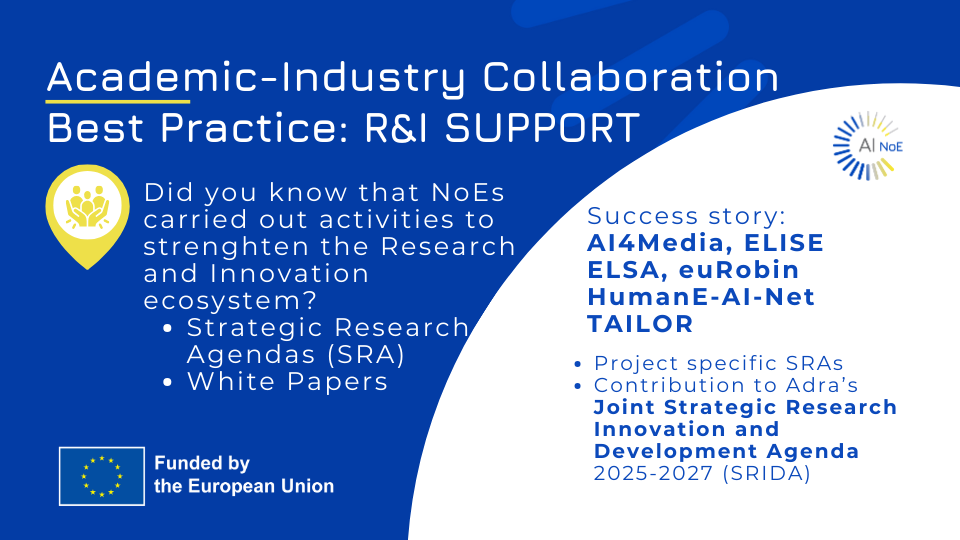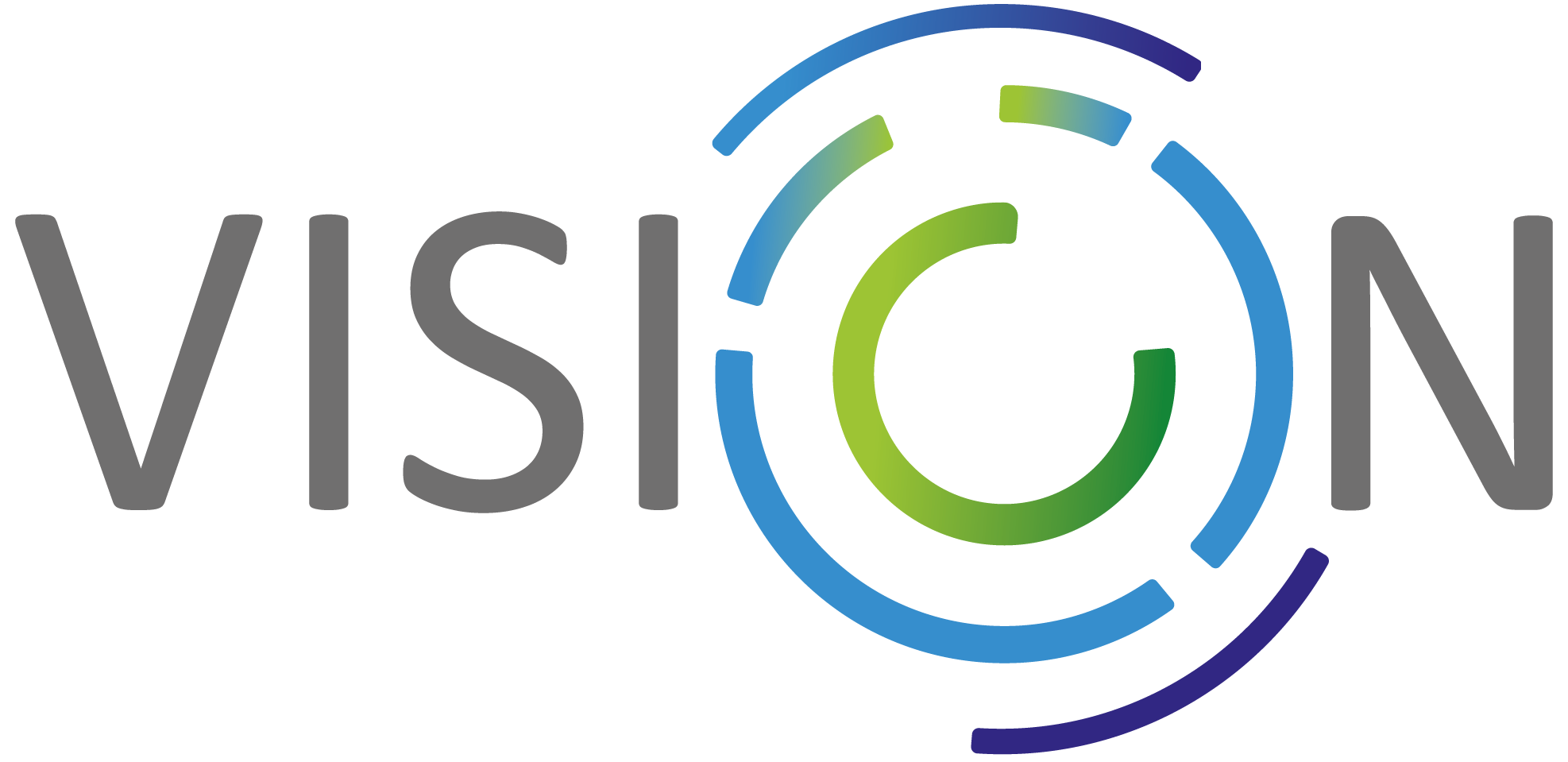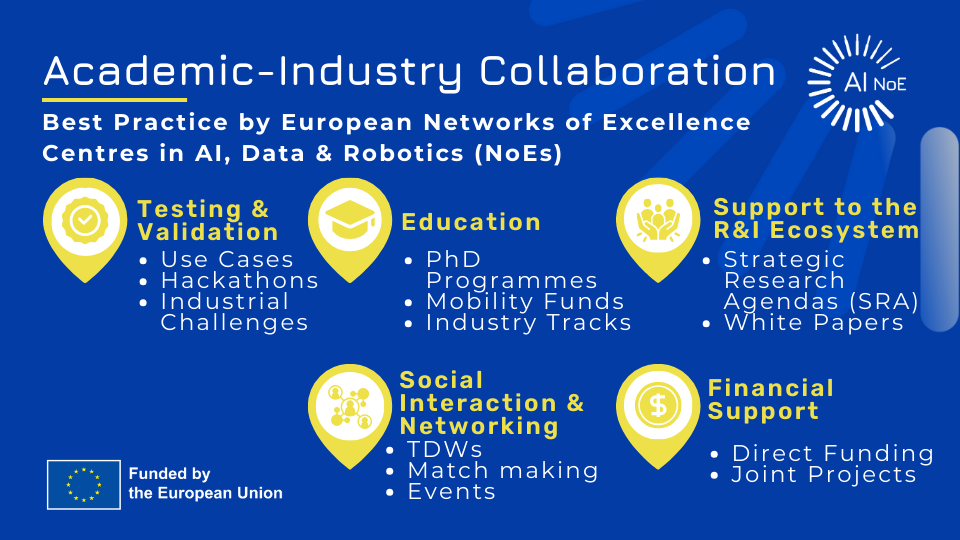Cross-Network Best Practices:
Academic-Industry Collaboration
The European Networks of Excellence Centres in AI, Data and Robotics – NoEs – have worked together intensively under the facilitation of the VISION team since 2022 and shared their experience on the collaboration with industry.
Based on that, the Cross-network Working Group put together the outcomes of these discussions and elaborated a comprehensive material on the best practice sharing related to project collaboration between academia and industry.
We bring you the overview of best practices, success stories, common challenges and recommendations for future projects.
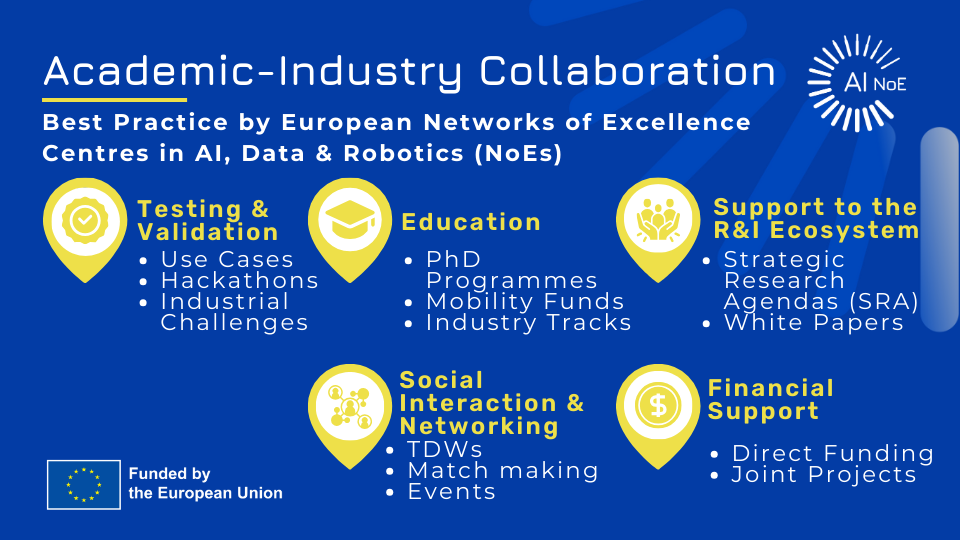
Methodology – 5 categories
Academic and Industry collaboration during the lifetime of these NoE R&I projects has facilitated discussions, developed results and technological advances on specific use cases over short periods of time, and contributed to the strengthening of existing and new relationships between academic and industrial partners.
The activities related to industrial collaboration within the NoEs can be organised into 5 main categories (for details click on each and learn more):
Meet industry partners where their interests lie.
Industry tends to be interested in the long term; where is the journey going, what are the next trends, and how to get there. It is crucial to meet industry partners where their interests and research objectives converge, rather than pushing forward an agenda that is not compatible. Workshops are a good opportunity to move outside of the short-term priorities of collaborative research projects and to consider the mid-term and long-term perspectives. Industry representatives are more likely to see the interest of getting involved in different project activities if all three perspectives are considered.
Remember that there is no “blank page”.
All R&I projects have to compromise between what the partners are already working on within their institutions and needs defined by the industry. There is no such thing as starting from scratch. Project partners should consider existing gaps between researchers and industry end users from the very beginning rather than waiting until the project has gotten up and running to discover where the gaps are. Including industrial partners that have previously worked with academic or research partners will also help jump start activities from the beginning of a project. Finally, pull from the experience of your partners and coordinators and adapt existing methodologies for your needs. For them to be effective, they should be easily available and adaptable, for example via the AI-on-Demand platform.
Choose the right people and maintain active involvement.
Effective involvement of industry partners requires active investment in the project. Get everyone involved from the beginning of the project and deliver to industry partners what was promised during proposal writing. This will empower all partners to take ownership of the results and get involved. To successfully identify potential network or initiative gaps, make sure you are talking to the right people and identify individuals working in interconnected projects that can help bridge networks together.
Preparation is imperative for successful social interactions.
The preparation phase of event planning can be very difficult; be sure to begin planning early and allow ample time for follow-up. Organisation committees should ensure equal representation of industry and academic partners. Themes and topics should be appealing, digestible, and not too broad in scope. Co-organizing with both industry and academic partners helps ensure the facilitation and exchanges of ideas and expertise as well as a broad representation of different profiles at the meeting. Finally, while online formats were first used out of necessity (due to Covid-19), they were very effective, allowing high level speakers to attend more easily as well as broader representation. However, for smaller groups and more in-depth discussions, physical meetings may be more effective.
Effectively utilise the AIOD platform.
The AI-on-Demand Platform (AIOD) should be the go-to platform to enhance networking and encourage increased communication among research institutions and DIHs. Consider what services or propositions will be offered in addition to the repository (possibilities mentioned included as a marketplace, benchmarking, supportive reporting,…), Ensuring interoperability with projects and their existing services and platforms is crucial to the AI-on-Demand’s success.
Testing and Validation
which took the shape of co-created use cases, hackathons, or industrial challenges in a number of different industry sectors. Two main roles were identified for industry partners; as a technology provider or as an end user and often as use case (co)-lead together with an academic partner. Balanced representation from research, industry and social sciences & the humanities partners is crucial for success.
NoEs Specific Activities:
- AI4Media: Co-creation of use cases (demonstrators)
- ELSA: Use Cases
- euRobin: Cooperative Competitions and Hackathons
- HumaneAINet: Industrial use cases; Hackathons
- TAILOR: Hackathons and Industrial Challenges; Use cases and showcases
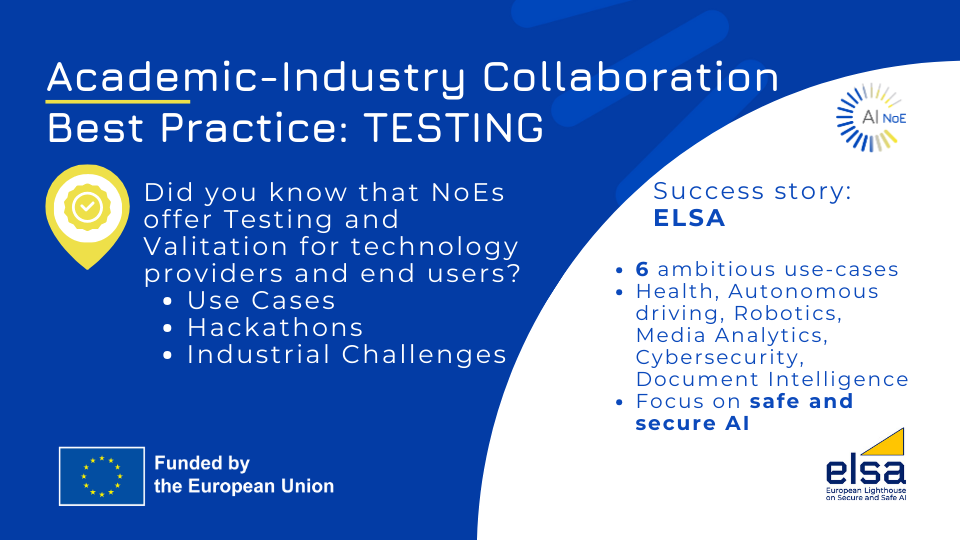
Financial Support
including dedicated funding for short-term projects with specific objectives (i.e. cascade funding, microprojects, open calls), or through dedicated funding for exchanges (i.e. mobility or connectivity funds) prizes, awards, or connectivity funds. Short term project funding ranged from 40 000 to 60 000 € and durations from 2 to 12 months, destined for start-ups and SMEs. PhD and post-docs could also benefit from an industry placement using the mobility and connectivity funds, facilitating on-site research visits or participation in conferences.
NoEs Specific Activities:
- AI4Media: AI4Media Open Calls for SMEs; Junior Fellows Exchange Program
- ELISE: Cascade funding: open calls for SMEs or Startups
- ELSA: Innovation lab including Benchmarks Platform and Open calls for SMEs / Start-ups; Mobility programs
- euRobin: Cascade funding instruments
- HumaneAINet: Microprojects
- TAILOR: Connectivity Fund
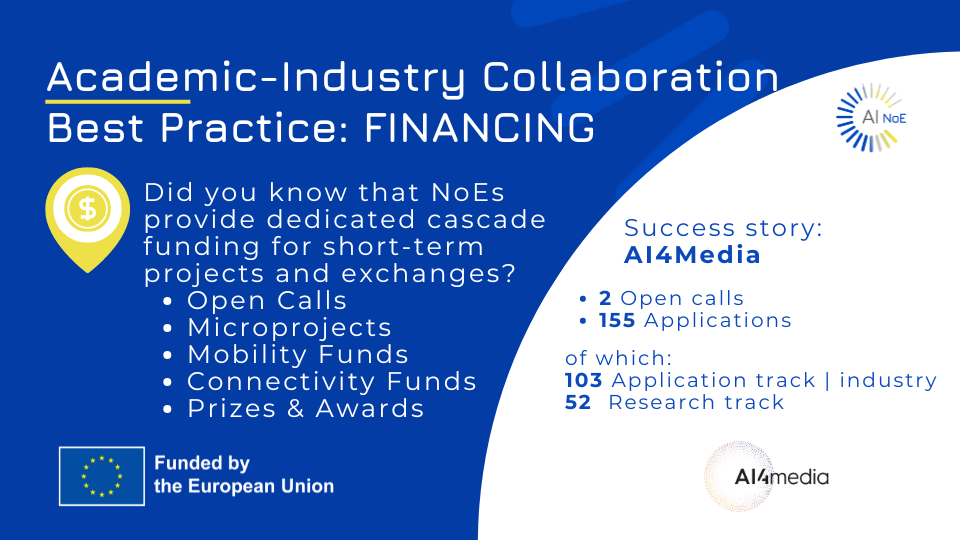
Social Interaction and Networking
including physical or online events such as conferences, workshops and panel discussions. The format focused on long term strategy and trends. Workshops included Mini workshops to facilitate a co-creation process with both industry and technical partners, Theme Development Workshops (TDWs) where current hot topics in AI were discussed including keynote speeches and breakout sessions, and Speculative workshops where partners attend a workshop to come up with potential illustrative scenarios of new technologies or algorithms.
NoEs Specific Activities:
- AI4Media: Network of Associate Members
- ELISE: Catalogue of AI Centers
- ELSA: Events and summer schools
- euRobin: Technology and career match-making
- HumaneAINet: Matchmaking events, other events
- TAILOR: Theme Development Workshops
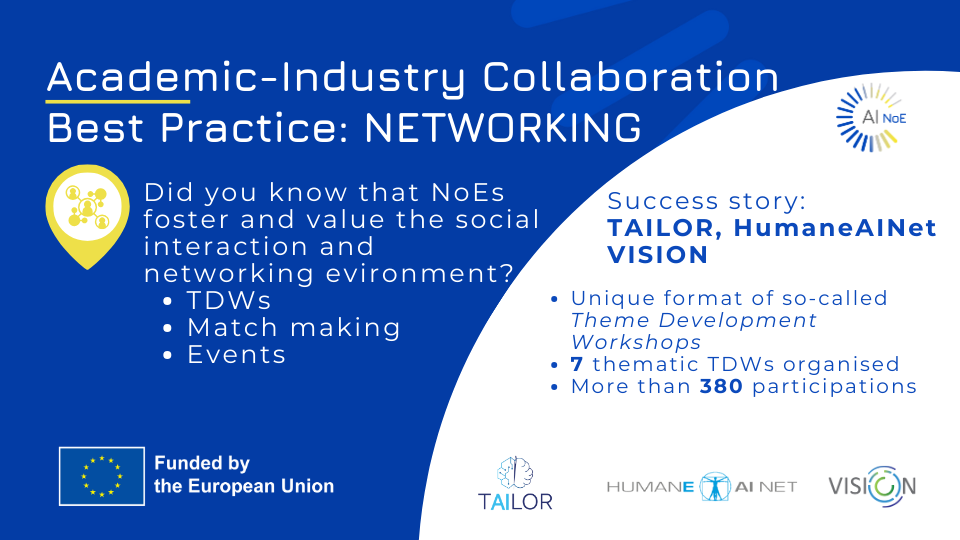
Education
such as industry-oriented PhD programmes, mobility funds, and industry tracks. Education in this best practices is only viewed through the lens of industry collaboration.
For more information about education and the research perspective, please visit also:
AI4Media Junior Fellow Exchange programme, CEF by AIDA & TAILOR,
or ELSA Mobility program.
NoEs Specific Activities:
- ELISE: ELLIS PhD & Postdoc Programme + Industry track
- euRobin: Industrial internships
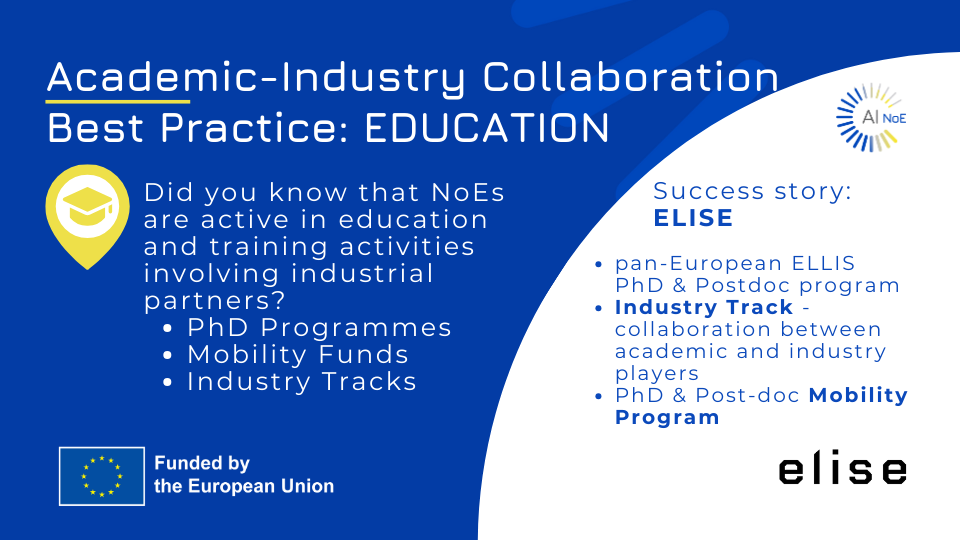
Support to the R&I Ecosystem
through contribution to industrial roadmaps and Strategic Research Agendas of each of the NoEs as well as Adra’s Joint Strategic Research Innovation and Development Agenda 2025-2027 (SRIDA), collaboration with existing networks, NoEs, and initiatives including the European Digital Innovation Hubs (EDIHs), use or deployment of existing platforms and the AI-on-Demand Platform, which is considered a “one-stop shop for everything AI made in Europe”.
NoEs Specific Activities:
- AI4Media: Strategic Research Agenda; White papers
- ELISE: Strategic Research Agenda
- ELSA: Strategic Research Agenda; Grand Challenges
- euRobin: Strategic Research Agenda
- TAILOR: Strategic Research Agenda
- Joint Strategic Research Agenda
